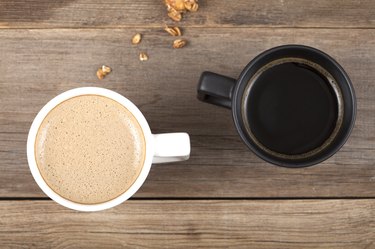
Do you love hot beverages and the boost they give you? The caffeine in cocoa powder, tea and coffee often wakes you up and makes you feel more productive throughout the day, but the drug can also come with health precautions you should know.
Read more: 5 Unexpected Benefits of Drinking Matcha Tea
Video of the Day
Video of the Day
Caffeine in Cocoa vs. Coffee
Almost everyone drinks some form of a caffeinated beverage. According to a January 2014 study published in Food and Chemical Toxicology on beverage caffeine intakes in the U.S., researchers found that 85 percent of the U.S. population drinks at least one caffeinated beverage each day. The average intake was 165 milligrams of caffeine per day for all ages.
But not all caffeinated beverages are the same. Caffeine counts vary in coffee, tea and cocoa due to method of preparation and strength:
Coffee. The amount of caffeine in a cup of coffee can range depending on how the coffee beans get roasted, ground and brewed. For example, according to the Center for Science in the Public Interest (CSPI), a 16-ounce cup of Starbucks Pike Place Roast contains 310 milligrams, and a 16-ounce cup of Starbucks Americano contains 225 milligrams.
But overall, coffee contains the most caffeine when compared to tea or cocoa. If you wish to reduce your caffeine intake, drinking decaf can significantly help. A 16-ounce cup of Starbucks decaf coffee contains a mere 25 milligrams, 12 times less than a fully caffeinated 16 ounces, according to the CSPI.
Tea. Like coffee, teas contain different rates of caffeine, which are attributed to the length of brewing time, brand, parts of water to tea and serving size. For example, green tea contains less caffeine than black tea — an 8-ounce bottle of Arizona Iced Tea contains 15 milligrams of caffeine compared with the same brand of black tea, which contains 7.5 milligrams, per the CSPI.
Typical herbal teas don't contain any caffeine. This is considerably less than the triple-digit milligrams you get in coffee. If you are a tea drinker looking reduce the amount of caffeine in green tea, you can rinse the tea leaves for 180 seconds in hot water measuring 95 degrees C, which removes most of the caffeine from the leaves, according to a November 2017 study from the Journal of Clinical Biochemistry and Nutrition.
Cocoa. A cocoa caffeine myth is that cocoa contains less caffeine than tea. This is not always true. Although cocoa powder and hot chocolate contain caffeine, the milligram count might be higher than you think.
For example, a Starbucks hot chocolate contains 25 milligrams and Hershey's Cocoa contains 8 milligrams in 1 tablespoon, per the CSPI. This is actually more than some branded teas. If you want to bring down the caffeine count, try mixing in more milk while reducing the amount of cocoa powder in a cup, or mix the cocoa powder with hot water.
Read more: 5 Steps to Brewing Your Healthiest Cup of Tea
Caffeine Health Precautions
Although caffeine can make you feel awake, this is a drug and comes with side effects based on your size, weight, how much you ingest and your overall health. Such health precautions include:
- Long-term effects from regular use of caffeine (more than 4 cups per day) can result in restlessness, difficulty sleeping and rapid heart rate, according to the Alcohol and Drug Foundation.
- Seizures can occur with fast consumption of around 1,200
milligrams, per a December 2018 Food and Drug Administration (FDA) report. The FDA also states that pure or highly concentrated caffeine has contributed to at least two deaths in the U.S. "in the last few years."
- According to a 2017 comprehensive review published in Frontiers in Psychiatry on the safety of ingesting caffeine, researchers found that among the vulnerable population — which includes children, adolescents, pregnant and lactating women, and anyone with a heart condition — caffeine consumption can be harmful and cause cardiovascular malfunctions and substance abuse.
- Alcohol and Drug Foundation: “Caffeine”
- Food and Chemical Toxicology: “Beverage Caffeine Intakes in the U.S.”
- Center for Science in the Public Interest: “Caffeine Chart"
- Food and Drug Administration: "Spilling the Beans: How Much Caffeine Is Too Much?"
- Frontiers in Psychiatry: "The Safety of Ingested Caffeine: A Comprehensive Review"
- Journal of Clinical Biochemistry and Nutrition: "Ingestion of Green Tea With Lowered Caffeine Improves Sleep Quality of the Elderly Via Suppression of Stress"
- Linus Pauling Institute at Oregon State University: Tea
- Linus Pauling Institute at Oregon State University: Coffee